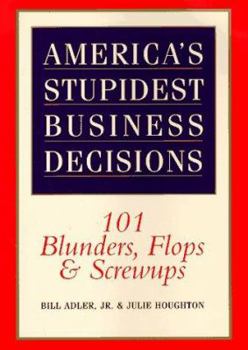America's Stupidest Business Decisions: 101 Blunders, Flops, And Screwups
Select Format
Select Condition 
Book Overview
Americas Stupidest Business Decisions is a hilarious and hugely entertaining selection of absolutely true business blunders. Covering inane inventions, miserable product flops, promotional bungles, and disastrous investment decisions, this is a very smart and witty celebration of noble business ventures that turned into humiliating flops. Did you know about the time the NYNEX telephone company inadvertently mailed millions of phone-card customers postcards with their highly confidential PIN numbers right on the card where anyone could see them? Or that after twenty years in the automobile business, the Vector Aeromotive Corporation built just twenty-two cars-and lost more than $29 million-in its quest to produce the worlds fastest, most luxurious, most expensive sports cars? Offering a wonderful assortment of classic business duds such as the Ford Edsel, New Coke, the healthy cigarette, everlasting shoes, and throwaway paper clothing, Americas Stupidest Business Decisions exposes the howlers you never saw on the evening news-even though they were committed by some of the countrys largest corporations and most famous characters.
Format:Paperback
Language:English
ISBN:0688151523
ISBN13:9780688151522
Release Date:November 1997
Publisher:Harper Perennial
Length:208 Pages
Weight:0.42 lbs.
Dimensions:0.7" x 5.0" x 7.0"
Customer Reviews
1 rating
America's Greatest New Product Failures in the 20th Century
Published by Thriftbooks.com User , 24 years ago
Since most new products fail, this list is over 80 percent product failures that were very expensive. The book is an object lesson in why companies should improve their new product development practices to stop spending when any new product looks iffy. I was impressed that almost all of these cases were known to me. That made me feel better that I have been focusing on the right examples of stalled thinking in companies. The book is well summarized. I only found one where the capsule history wasn't basically accurate. That was the case of Osborne and its bankruptcy after having introduced portable computing. The authors failed to mention that Osborne announced an advanced product that was delayed, which killed the sales of the existing product. In the absence of enough cash, the company was gone. On the other hand, some of the cases will be hard for people to understand who don't know all the background. For example, the story of the unsuccessful New Coke doesn't have enough detail about why Coca-Cola made its monumental mistake.The book could have been greatly improved if it had some sort of overview about what the lessons of these failures were. The absence of the overview is why I reduced the rating by one star.I found the book to be a useful reminder of the many sources of stalled thinking that have harmed major companies. Most of us would benefit by reviewing these failures on a regular basis.My favorite example was of W.C. Fields. In the days before ATMs, he hated to be in a city where he had no money. So he opened bank accounts in virtually any city he ever visited. To match his humorous perspective, he didn't use his real name on these accounts. He made up funny ones instead. The only problem was -- he couldn't remember which cities, which banks, and which names he used. When he died, an estimated $1.3 million was sitting unclaimed in accounts that he couldn't remember were his. You might call this the Ad Lib stall. Being from Boston, I was not surprised to see that the sale of Babe Ruth by the Red Sox to the Yankees made the list. Still, you'll have a good laugh! Also, I suggest you take a few minutes to write down what you think the lessons are from these examples are for your organization. That will make the book much more valuable for you.






